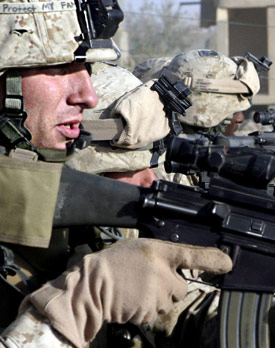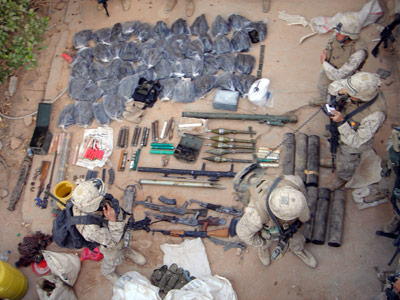Operation Steel Curtain - Day 3
Operations continue in Husaybah as Day 3 of Operation Steel Curtain comes to an end. By clearing and denying one of the closest safe havens just inside Iraq, Coalition Forces aim to make the journey of foreign fighters coming into Iraq much riskier, as the terrorists would have stay on the roads or come through the Euphrates river valley, or worse, come across the open desert.
(For a map of the area around Husaybah, see the excellent map at The Security Watchtower.)
According to an article today in the Marine Corps Times by Gordon Trowbridge, the operation may have surprised the terrorists by coming from an unexpected direction.
If this is true, the terrorists aren't terribly good at learning past lessons. Much the same tactic was used at Fallujah in November 2004. The US military set up strong in the south of Fallujah, making the terrorists think the main attack would come up from that direction. However, the thrust of that attack came from the north and northeast. When you're the target, it may not matter much if you're getting hit by the hammer or by the anvil, it feels the same. However, this may be a sign that most of the more experienced terrorist commanders are no longer around to teach these lessons.
Still, the fighting in close quarters is dangerous as it always is. From an MNF press release, the terrorists are not respecting mosques as neutral ground.
From this CentCom press release, three terrorists approached a checkpoint dressed in womens clothing:
A Marine was killed Sunday in Husaybah. A photographer was lightly wounded Saturday. A Marine who pulled him to safety was also wounded. About 40 insurgents have been confirmed killed, according to this Washington Post article.
MNF also released news that yet another facilitator was killed October 31, along with a terrorist cell leader. They operated in and near the towns of Karabilah and Ubaydi.
Note from the press release that Abu Umar had just taken his post, as had other facilitators also killed recently.
The terrorist underground railroad is losing leaders as fast as they can be replaced, and with the pounding the entry area of Husaybah is taking, the flow of foreign fighters into Iraq is under great pressure.
Operation Steel Curtain - Nov 5
-----
Bill Roggio comments here on Day 3 of Steel Curtain.
Michelle Malkin has a roundup of links on Day 3, and a note on Project Valour-IT.
 |
| Sgt. James H. Harrison, foreground left, 1st Platoon Sgt., attached to India Company, 3rd Battalion, 6th Marines, looks over a rooftop at the source of enemy fire during Operation Steel Curtain in Husaybah, Iraq, on Sunday. The major offensive on the city by about 3,500 U.S. and Iraqi troops met limited resistance on its opening day. Cpl. Neill A. Sevelius / U.S. Marine Corps / AP Photo |
(For a map of the area around Husaybah, see the excellent map at The Security Watchtower.)
According to an article today in the Marine Corps Times by Gordon Trowbridge, the operation may have surprised the terrorists by coming from an unexpected direction.
"We surprised them coming into Husaybah from the west," said Capt. Brendan Heatherman, commander of the battalionís Kilo Company. "I think they started pulling back to spots where they can set up a better defense."
The assault on Husaybah began at dawn Saturday, after two Marine infantry battalions moved across the desert to the cityís western edge, right on the Syrian border.
The long movement was an attempt to surprise insurgents in the city, who Marine commanders believe were expecting any assault to come from the east, in the neighboring village of Karabilah, where Marines hold a line of small firebases occupied during fighting in October.
If this is true, the terrorists aren't terribly good at learning past lessons. Much the same tactic was used at Fallujah in November 2004. The US military set up strong in the south of Fallujah, making the terrorists think the main attack would come up from that direction. However, the thrust of that attack came from the north and northeast. When you're the target, it may not matter much if you're getting hit by the hammer or by the anvil, it feels the same. However, this may be a sign that most of the more experienced terrorist commanders are no longer around to teach these lessons.
Still, the fighting in close quarters is dangerous as it always is. From an MNF press release, the terrorists are not respecting mosques as neutral ground.
The combined force is clearing the city, house by house, as the al Qaeda in Iraq-led terrorists continue to plant improvised explosive devices throughout the city and fire on the Marines and Iraqi Army Soldiers from homes, schools and mosques. Terrorists frequently use religious and public buildings to launch their attacks.
Iraqi Army Soldiers and Marines were fired on by terrorists from mosques in two separate incidents Nov. 6. In both cases, Iraqi Army Soldiers entered quickly and searched the mosques. The terrorists had cleared the buildings before the Iraqi soldiers arrived on the scene.
Pockets of resistance have been encountered and eliminated by the Iraqi Army Soldiers and Marines throughout the day. Ten targets were struck today by Coalition air strikes. Marines can confirm 17 terrorists have been killed since the operation began yesterday. Many more are suspected of being killed, but Coalition forces havenít been able to confirm those numbers yet. All air strikes were conducted using precision-guided munitions to ensure destruction of the target while limiting collateral damage. There have been no reports of civilian casualties or of civilians leaving the region due to the operation.
 |
| Marines make an inventory of a weapons cache found during Operation Steel Curtain in Husaybah, Iraq, on Monday U.S. Marine Corps / AP Photo |
From this CentCom press release, three terrorists approached a checkpoint dressed in womens clothing:
Iraqi Army Soldiers shot and killed three terrorists dressed in womenís clothing near the entrance to the safety zone established for displaced persons. The trio brandished weapons as they neared the checkpoint the Iraqi Soldiers were manning, but were unable to use them before being killed by the Soldiers. Iraqi Soldiers identified the terrorists as foreign fighters. The three terrorists were trying to hide among the women and children and gain access to the area for residents temporarily displaced.
A Marine was killed Sunday in Husaybah. A photographer was lightly wounded Saturday. A Marine who pulled him to safety was also wounded. About 40 insurgents have been confirmed killed, according to this Washington Post article.
MNF also released news that yet another facilitator was killed October 31, along with a terrorist cell leader. They operated in and near the towns of Karabilah and Ubaydi.
Coalition forces can now confirm the death of two key al Qaeda in Iraq terrorist leaders who were killed during those air strikes. These terrorists operated in the Husaybah, Karabilah, Ubaydi, and Al Qaim region.
They are Abu Umar, a senior al Qaeda in Iraq terrorist leader and foreign fighter facilitator who was the commander of several terrorist cells in the Ubaydi, Husaybah, and al Qaim region, and Abu Hamza, was a senior al Qaeda in Iraq terrorist cell leader who was the commander of several terrorist cells in the Husaybah and Karabilah areas.
Note from the press release that Abu Umar had just taken his post, as had other facilitators also killed recently.
Abu Umar had just replaced Abu Asil who was killed in a coalition air strike a few days prior. He assisted Abu Asil in the smuggling of foreign fighters in the to al Qaim region.
The terrorist underground railroad is losing leaders as fast as they can be replaced, and with the pounding the entry area of Husaybah is taking, the flow of foreign fighters into Iraq is under great pressure.
| Facilitator | Killed in | Date killed |
| Abu Ali | Jaramil | Sept 7 |
| The Sheik | Ubaydi | Sept 10 |
| Abu Nasir | Ushsh | Sept 26 |
| Abu Dua | Ushsh | Oct 26 |
| Abu Mahmud | Husaybah | Oct 28 |
| Abu Sa'ud | Ubaydi | Oct 29 |
| Abu Asil | Husaybah | Oct 29 |
| Abu Umar | Ubaydi | Oct 31 |
| Abu Asim | Husaybah | Nov 2 |
Operation Steel Curtain - Nov 5
-----
Bill Roggio comments here on Day 3 of Steel Curtain.
Michelle Malkin has a roundup of links on Day 3, and a note on Project Valour-IT.








2 Comments:
At Tue Nov 08, 01:17:00 PM, Wayne M said…
Jeff,
You are really doing a yomen's work here. You are a fantastic writer and great with the details.
Keep up the great work.
Too bad you didn't win yesterday. We were ruttin's for you and doing a little ballet stuffin' to boot...lol
At Tue Nov 08, 01:42:00 PM, Jeff said…
Thanks, Wayne. And hey, we wouldn't be MOBsters if we didn't stuff a few ballots!
Post a Comment
<< Home